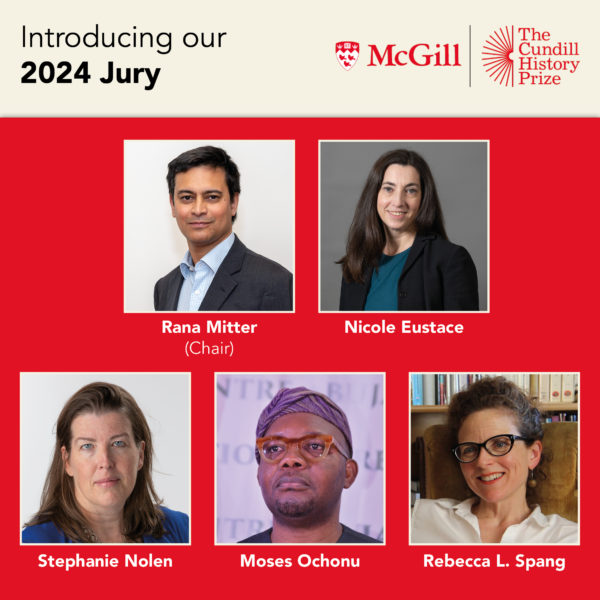May 16th 2024 in News
2024 Cundill History Prize Jury announced as submissions close for record year

Leading historians and writers in a breadth of fields, from early modern Atlantic World political and cultural studies, postcolonial modern Africa, and money and consumption in eighteenth and nineteenth-century Europe, historians Nicole Eustace, Moses Ochonu, Rebecca L. Spang, and journalist and writer Stephanie Nolen join chair Rana Mitter to complete the 2024 Cundill History Prize jury, deliberating over a record year for submissions.
Rana Mitter said regarding the selection of his fellow jurors: “It’s an immense privilege to chair such a distinguished group of jurors who bring with them knowledge not only of a wide range of historical topics, but also a true understanding of why history matters for the present day.”
Julius Silver Family Professor of History at New York University, Nicole Eustace, said: “I am delighted to serve on the Cundill History Prize jury in service of its mission to promote vivid historical writing with vital implications for the present. The best historical writing brings the past to life in ways that illuminate the present, engaging readers in investigating the deeper context of current conditions.”
Global Health Reporter for The New York Times and 2024 Poynter Fellow in Journalism at Yale University, Stephanie Nolen, has reported from more than 80 countries around the world. On her appointment to the Cundill History Prize jury, she said: “I love when a history book sweeps you up in a place or a time or even an object that you knew little or nothing about, and makes it so compelling that you lose yourself. My job, journalism, is a marriage of research and storytelling, and a great book of history is both: a well-told tale that is built on an architecture of rigorous reporting.”
The Cornelius Vanderbilt Chair in History and Professor of African History at Vanderbilt University, Moses Ochonu said: “Serving on the 2024 Cundill History Prize jury is a rare opportunity to get acquainted with the most sophisticated works being undertaken in the global historical profession, works that challenge and extend existing methodological, and analytical approaches while broaching new ways of grappling with the past. As a historian of Africa who is drawn to pathways into the past that are rigorous, aesthetically grounded, and accessible to non-specialists, I will be reading the submissions with an eye for aesthetic novelty, methodological disruption, and insight into the human condition. Our world stands challenged by multiple forces, but good history writing can mitigate the short-term anxieties of the present by taking us into how societies coped with and learned from adversity in the proximate and deep past and sometimes used it as a springboard to thrive.”
Professor of History at Indiana University-Bloomington and Dean (Interim) of the Hutton Honors College, and 2023 New America National Fellow, Rebecca L. Spang, said: “Everything in the past happened, but it didn’t have to happen. This is the lesson of history: nothing is inevitable and very little of what humans do is a product of nature alone. The best history books give readers a new understanding of past contingencies and, in doing so, open the way to new futures and better possibilities.”
Last year, Tania Branigan, Foreign Leader Writer at The Guardian, was named the winner for Red Memory: Living, Remembering and Forgetting China’s Cultural Revolution (Faber), for her ‘haunting’ excavation of the Cultural Revolution. Uncovering forty years of silence, Branigan’s Red Memory gives voices to those who lived through Mao’s decade of madness.
Along with Tania Branigan (2023), this year’s winner will join the prize’s alumni of world-class historians, including Tiya Miles (2022), Marjoleine Kars (2021), Camilla Townsend (2020), Julia Lovell (2019), Maya Jasanoff (2018), Daniel Beer (2017), Thomas W. Laqueur (2016), Susan Pedersen (2015), Gary Bass (2014), Anne Applebaum (2013), Stephen Platt (2012), Sergio Luzzatto (2011), Diarmaid MacCulloch (2010), Lisa Jardine (2009), and Stuart B. Schwartz (2008).
The winner will be announced at the Cundill History Prize gala held in Montreal on Wednesday October 30, and the progress of jury deliberations and announcements will be shared to an ever-growing audience through a network of partners, which last year included CBC Ideas, Literary Hub, History Hit, BBC History Extra and Literary Review of Canada.
Share this
Archive
2025: February (1) March (1) July (1) September (2) October (1)2024: February (1) March (1) May (1) August (1) September (2) October (2)
2023: February (1) June (1) September (1) October (1) November (1)
2022: March (1) June (1) September (2) October (1) December (1)
2021: February (1) April (1) September (2) October (1) December (1)
2020: February (1) May (1) September (2) October (1) December (1)
2019: March (1) June (1) September (2) October (1) November (2)
2018: April (1) June (1) September (2) October (1) November (1)
2017: May (1) July (1) September (1) October (2) November (1)
Recent Posts
Lyndal Roper wins 2025 Cundill History Prize for Summer of Fire and Blood
Freedom, Independence and Choice: Finalists for the 2025 Cundill History Prize Announced
The 2025 Cundill History Prize Shortlist
The 2025 Cundill History Prize Longlist
2025 Cundill History Prize Jury announced as record number of submissions received
Kathleen DuVal wins 2024 Cundill History Prize for Native Nations